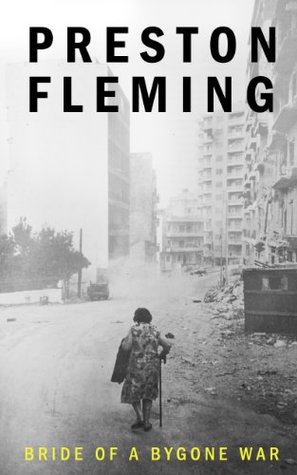Title: Bride of a Bygone War
Author: Preston Fleming
Publisher: PF Publishing
ISBN: 978-0-98295-942-7
Pages: 210, Paperback/Kindle
Genre: Fiction
Reviewed by: Brandon Nolta, Pacific Book Review
Book Review
Imagine you live in an area where sudden attacks are common, where the city in which you live has gone from a warm paradise to a place of sudden death and daily bullet-dodging, and where your job requires you to navigate shifting allegiances and keep your romances limited in scope and subject to sudden, unexplained endings. This is the world of Walter Lukash, the protagonist of Preston Fleming’s Bride of a Bygone War, and as the narrative opens, coming back to it has more than its share of dangers for him.Set at the turn of the 1980s, the novel follows Lukash, who was suddenly transferred away from Beirut five years before, just as suddenly returning. Told he would be performing a two-month low-profile assignment, his orders are swiftly changed to a two-year assignment involving recruitment of spies from a new military faction among the Lebanese. Dangerous enough by itself, but Lukash has a secret: Before his sudden transfer, he married a Lebanese woman in defiance of standard protocols regarding security clearances and romantic entanglements. To make things more complicated, his present girlfriend is seen as a security risk, one that the CIA is quickly running out of patience over. Between the numerous identities, the women in his past and the travails of simply existing in a war-torn Beirut, the discovery of a secret plot to intensify hostilities and incite deeper U.S. involvement barely passes muster as a noteworthy event in Lukash’s life.
Unlike the dystopic near-future setting of his Kamas novels, Fleming sets this book – part of a trilogy – in a firmly grounded and well-documented historical setting, the Middle East of the 1980s. Bolstered by his own experiences working in the region, Fleming provides a sharp sense of place and time, letting important details work through background settings and keeping the narrative anchored in a tangible world. While some aspects of the plot work better than others – by the book’s end, Lukash’s romantic life almost seems to carry more narrative importance than his job as a CIA case officer – the various threads mesh fairly well in a believable portrait of how professional liars and secret-keepers might navigate love and war in a culture not their own. For fans of Fleming’s other novels, one of his signature touches of mysticism creeps in toward the end; a character’s dream seems to be shared among two wholly unconnected characters and come to life in a direct fashion, which seems to carry a thematic resonance for the author, although its importance to the story as a whole is unclear. Still, this brief detour does not detract from the well-machined flow of the story, which overall displays Fleming’s skill as a writer of literate, thoughtful thrillers that have something more to share than just a mastery of genre mechanics.


